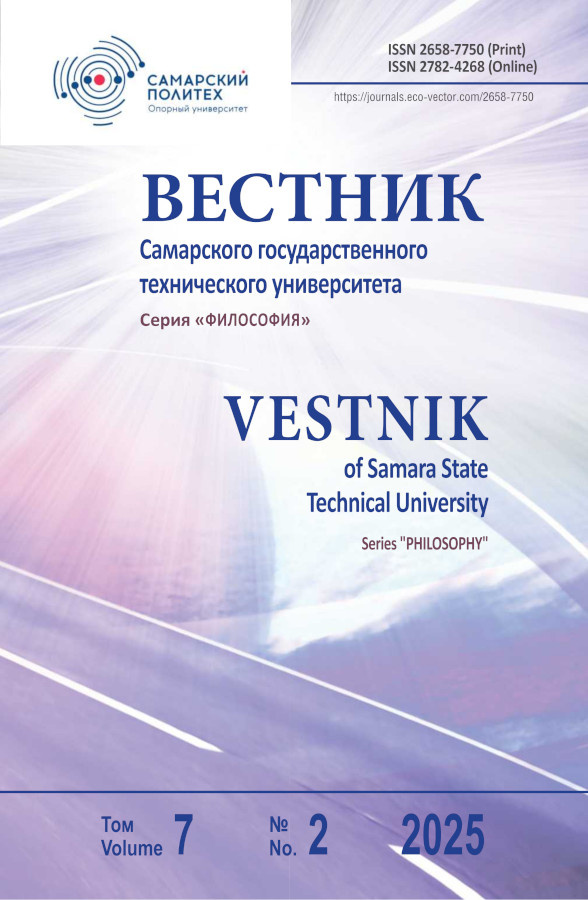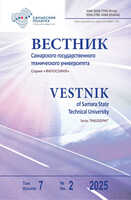Vestnik of Samara State Technical University. Series Philosophy
The journal has been founded in 2019. At the present day the journal founder is Federal State-Funded Educational Institution of Higher Education Samara State Technical University. Registration Certificate "PI № FS77-68052" dated 13.12.2016. The journal was assigned the international number of periodicals ISSN 2542-0151.
Articles submitted for publication in the journal are subject to mandatory independent review, the reviewers are members of the editorial board and leading Russian scientists working in the field of scientific topics of the journal.
The journal is published once a quarter (four times a year) in the following enlarged sections "Philosophy", which includes the following thematic headings:
- 5.7.1 - Ontology and theory of knowledge
- 5.7.2 - History of philosophy
- 5.7.7 - Social and political philosophy
All questions on manuscript submission are to be referred to Isaev R. O., the executive secretary of the journal , romanceisaev@gmail.com
最新一期
卷 7, 编号 2 (2025)
ОБЩЕСТВО. КУЛЬТУРА. ЧЕЛОВЕК
Traditional values: the logic of the concept
摘要
The article examines the concept of traditional values in the context of specific traditions, as well as taking into account the distinction between values and various phenomena of reality.
 5-13
5-13


The impact of digital transformation of education on the processes of socialization and development of the younger generation in man-made living conditions
摘要
The article is devoted to the study of the impact of the digital transformation of modern education on the processes of socialization and development of the younger generation. The main focus is on the need to focus education on teaching various options for safe human interaction with the digital environment, as well as the introduction of technologies into the educational process that do not hinder the development of the younger generation. The article presents the opinions of domestic and foreign scientists who study the processes of digital transformation of education and human functioning in digital reality. Conclusions were made that in addition to the deliberate introduction of digital technologies into the educational process, it is necessary to focus on the creation of a social and pedagogical support service for students and their families, which would allow us to approach the solution of problems of socialization and adaptation of a person in the conditions of technogenic reality and to form a personality capable of influencing the world around us, providing a safe living environment.
 14-30
14-30


Dialectization of philosophy at home
摘要
The phenomenon of the house constantly attracts the attention of philosophers, but in each historical epoch in different aspects. At present, the philosophical problems of the house are qualitatively actualized due to the aggravation of the contradictory nature of the house and the increase of its role in the development of man, society and culture. Under these conditions, scientific research and philosophical understanding of the house have led to a process of dialecticization of ideas about the house and a refusal to consider it as a local, non-contradictory and non-developing phenomenon.
 31-39
31-39


ФИЛОСОФИЯ И МЕТОДОЛОГИЯ НАУКИ
Knowledge, truth, interpretations
摘要
The article proposes a new approach to ontological concepts of the phenomenon of "knowledge". Traditionally, knowledge is perceived together with codification in language and in a packaged form: books, numbers, records, images, reflexes, signals. In philosophy, the question of the source of knowledge (Plato, Descartes, Locke, Kant) is considered. In the methodology of science, traditional interest in knowledge is due to the differences between scientific knowledge and its other types. In medicine and related psychology, the question of knowledge is reduced, as in The Age of Enlightenment, "to the brain". In technical sciences, knowledge is equated with information and the corresponding "carriers". The article attempts to raise the philosophical question of knowledge beyond epistemology. In ontology, knowledge is analyzed in the context of an "exhibition": the world is not a warehouse, but an exhibition.
 40-54
40-54


Ontognoseological significance of the norm of stage exposition in philosophy
摘要
The article examines the standards of stage exposition in the context of ontognoseology as a doctrine of the essential unity of being and thinking. The logic of the problematic status of the standard of stagedness is substantiated, the essential features of expositional stages are revealed and their content is characterized. The specificity of differentiation of the assets of staged exposition is shown in connection with the reversal of the order of explication of the essential forces of human subjectivity. The main conceptual aberrations of each staged exposition are revealed. The standards of the essential assumption of reasonable reality are indicated.
 55-65
55-65


Artificial intelligence and succession issues
摘要
The article shows the relevance of the study of artificial intelligence (AI) as a factor in scientific and technological development, understanding of social problems and the specifics of the human mind, and the features of the cognitive process. Various approaches to understanding AI are presented. The results of using AI, its impact on interpersonal interaction, and the emergence of updated meanings of intersubjectivity are shown. The influence of AI on rethinking traditional approaches and the emergence of new problems is noted. The special relevance of the issue of exaggerating the role of AI in the life of a person and society, forgetting the danger of a person losing his spiritual and mental integrity, and his possible transformation into a soulless machine is emphasized. The need to include in the research field the problematic issue of the role of AI in the process of maintaining connections between generations and preserving continuity is proved. The possibilities of AI in this direction are considered. It is concluded that the general line of scientific research should contribute to the emergence of such AI systems that will be assistants to a person, not his masters. It is noted that it is necessary to create models during the development of artificial intelligence systems that maximally ensure the continuity of generations, facilitate the transmission of scientific and cultural achievements, the inheritance of traditions, including moral norms, which is possible with the participation of philosophers, psychologists, and the pedagogical community in their development.
 66-75
66-75


ФИЛОСОФЫ РОССИИ: ЖИЗНЬ И ТВОРЧЕСТВО
V.A. Kutyrev: milestones of life, creativity, anthropoconservatism
摘要
The theory of anthropoconservatism, created by V.A. Kutyrev (1943–2021), is a theory of criticism of the post-outside-human tendencies of modern technogenic civilization and the practical protection of human life proper, which is becoming increasingly relevant. A necessary component of the modern theory and practice of anthropoconservatism is an authentic reading of V.A. Kutyrev's philosophical legacy. The article presents the biography of the philosopher, in which existential plans shine through the scientific methodology and approach, forming a holistic image of Vladimir Alexandrovich in the horizon of a specific historical era and future times.
 76-82
76-82


PHILOSOPHY AND THE MODERN WORLD
Metaphysical grounds for the need to return the category of soul to the science of soul
摘要
The concept of the soul is not used in the science of the soul today, since modern psychology is unable to cover this phenomenon in its entirety. In psychology, as it exists today, issues related to the higher manifestations of the soul, such as spirit and spirituality, are not discussed. An attempt to see the quality of the soul based on the reflection of the body can only give limited knowledge of the summative qualities of the whole. The value of a person is still more determined by the emergent characteristics of his personality, such as spirit, soul, mind, intellect, consciousness and self-awareness, which are determined and conditioned by the existence of a person in the structure of systems of a greater order – society, humanity and the Cosmos.
 83-100
83-100


Continuity of partition and confluence
摘要
In the history of culture, and in philosophy in particular, there have been and continue to be many ways of thinking about man’s place in the world and our relationship with the Universe. Moving from myth to philosophy and from religion to science, human culture has acquired richness and diversity. In this connection, many trends, currents and schools of philosophy have emerged, addressing the fundamental problems of human life, consciousness, society, science and technology, ethics and logic, aesthetics and language, etc. Historians of philosophy usually try to systematize them, dividing the various schools of thought into large groups that differ from each other in one or more aspects. Most often, these are bipolar divisions, making the diversity of worldviews accessible to analysis. However, any analysis requires synthesis, which usually means “taking a higher position” by a commentator capable of generalizing and moving forward. The author’s main goal is to show the wave-like trajectories of clashing philosophical ideas, illustrating the constancy of division and the reverse movement toward synthesis, sometimes even harmony, or toward a fusion that is often unstable.The article mainly examines two pairs of opposing schools of thought in philosophy, namely essentialism/relativism and empiricism/rationalism, as well as two pairs of closely related concepts: nature/essence and reason/rationality. The author's theory of knowledge, called existential materialism, is presented.
 101-124
101-124


HISTORY OF FOREIGN PHILOSOPHY
Logic of the Talmud: problems of the quality of argumentation and consistency of thought in the Mishnah and THE Gemara
摘要
The article is devoted to the analysis of the text of the Talmud – one of the sacred books of Judaism – in terms of the problems of consistency and formal correctness of thinking, the quality of logical argumentation and compliance with the norms of academic discussion. It is shown that the heroes of the Talmud – the Jewish rabbis who lived in the first centuries of our era – were fully aware of the value of observing the laws of formal logic, despite the absence of direct references to Aristotle's Organon in the Talmudic discourse and ignoring the achievements of ancient philosophical thought. Arguing their position and refuting the points of view of their opponents, the Jewish sages worked out the norms and rules of a fruitful theoretical dispute, designed to discover, substantiate and correctly interpret true, objective knowledge that does not depend on the will, desires and ambitions of individual subjects.
 125-136
125-136


GRADUATE STUDENT TRIBUNE
The image of a hero in modern political mythology
摘要
In modern society, political consciousness is of great importance as an indicator of the attitude of subjects to the political life of society. In archaic societies, the ruler was identified with a mythical creature, since the sovereign was considered the viceroy of the gods. Modern political myths as a reflection of political reality construct a certain image for effective interaction with the audience. It becomes necessary to analyze the mechanism of the emergence of political myths and their functioning within society. The main objective of the study was to determine the connection between the myths of the past and the present, to establish whether the archaic plot of the hero-ruler is relevant in modern politics or whether this image is characteristic only of archaic times. The main methods for studying ancient rulers and political myths of the XX–XXI centuries were the methods of description, analysis and comparison. As a result of the study, the relationship between mythical sovereigns and modern political figures was determined. It was concluded that modern politicians reproduce the image of the hero-ruler in order to arouse the favor, trust of the audience and confirm the status of a political figure.
 137-147
137-147












